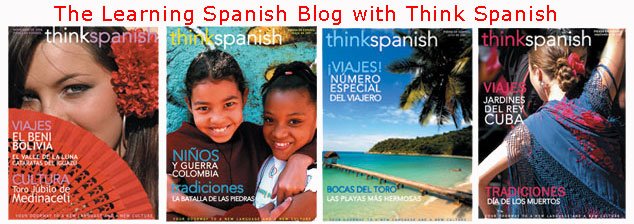Wednesday, February 18, 2009
Celebrating Carnaval
The festival of Carnaval is celebrated as a last indulgence of carnal pleasures that Catholics must give up for 40 days of fasting during Lent, from Ash Wednesday (Miércoles de Ceniza) to Easter Sunday (Domingo de Pascua). In fact, the word Carnaval is derived from Latin, meaning take away or goodbye to flesh, and strict Catholics will give up meat eating during Lent.
Carnaval is officially celebrated for 5 days, leading up to Ash Wednesday, with the most vigorous celebration taking place over the weekend (dias de fiestas). A rocket (cohete) is launched or to announce the start of the celebration, usually followed by more fireworks (fuegos artificiales). The wearing of masks (máscaras) during Carnaval is said to be a pagan practice as protection from evil spirits, but most likely evolved as a way to participate fully in the celebration with some anonymity! During Carnaval, everyone participates in the many events and activities that make up the celebration. Wherever Carnaval is celebrated the whole town parties during the day and into the night, dressed in their colorful costumes (trajes de colores) and going to masquerade balls (bailes de enmarcarados). People of all ages throw and break cascarones, confetti filled eggshells, over each other. There are many booths that offer food, drinks, snacks and games and crafts of every type. Music of all sorts is played non-stop, by live bands (bandas), and singing choirs (coros) fill the streets!
Some Carnavals also have a collection of rides like those found at an amusement park (parque de atracciones). Depending on the town, there may be many organized parties, outdoor festivals and fairs (ferias) Many of these types of events charge an entrance fee (precio de entrada), or may be entirely private. In the evenings there are fireworks displays (despliegue de juegos pirotécnicos) including the traditional castle (castillo), a large fireworks platform famous in Mexico. Even the kids get to stay out until late to take part and enjoy the festivities. On Saturday evening, there is the coronation of the Carnaval Queen, Reina de Carnaval and the humorous El Rey Feo, or Ugly King. There will also be the burning of an effigy, usually someone unpopular at the time, known as the Quema de Mal Humor or Burning of Bad Humor.
Sunday is the biggest organized celebration of the weekend, and typically includes elaborate floats (carrozas), a grand parade (desfile), contests (concursos) and more musicians playing on stages and dancing in the streets. When Monday arrives, there is El Día del Marido Oprimido, or the Day of the Oppressed Husband. On this one day, for 23.5 hours, husbands have the freedom to do as they wish ... within the law and religious faith of course!
Carnaval is officially celebrated for 5 days, leading up to Ash Wednesday, with the most vigorous celebration taking place over the weekend (dias de fiestas). A rocket (cohete) is launched or to announce the start of the celebration, usually followed by more fireworks (fuegos artificiales). The wearing of masks (máscaras) during Carnaval is said to be a pagan practice as protection from evil spirits, but most likely evolved as a way to participate fully in the celebration with some anonymity! During Carnaval, everyone participates in the many events and activities that make up the celebration. Wherever Carnaval is celebrated the whole town parties during the day and into the night, dressed in their colorful costumes (trajes de colores) and going to masquerade balls (bailes de enmarcarados). People of all ages throw and break cascarones, confetti filled eggshells, over each other. There are many booths that offer food, drinks, snacks and games and crafts of every type. Music of all sorts is played non-stop, by live bands (bandas), and singing choirs (coros) fill the streets!
Some Carnavals also have a collection of rides like those found at an amusement park (parque de atracciones). Depending on the town, there may be many organized parties, outdoor festivals and fairs (ferias) Many of these types of events charge an entrance fee (precio de entrada), or may be entirely private. In the evenings there are fireworks displays (despliegue de juegos pirotécnicos) including the traditional castle (castillo), a large fireworks platform famous in Mexico. Even the kids get to stay out until late to take part and enjoy the festivities. On Saturday evening, there is the coronation of the Carnaval Queen, Reina de Carnaval and the humorous El Rey Feo, or Ugly King. There will also be the burning of an effigy, usually someone unpopular at the time, known as the Quema de Mal Humor or Burning of Bad Humor.
Sunday is the biggest organized celebration of the weekend, and typically includes elaborate floats (carrozas), a grand parade (desfile), contests (concursos) and more musicians playing on stages and dancing in the streets. When Monday arrives, there is El Día del Marido Oprimido, or the Day of the Oppressed Husband. On this one day, for 23.5 hours, husbands have the freedom to do as they wish ... within the law and religious faith of course!
Subscribe to:
Posts (Atom)
